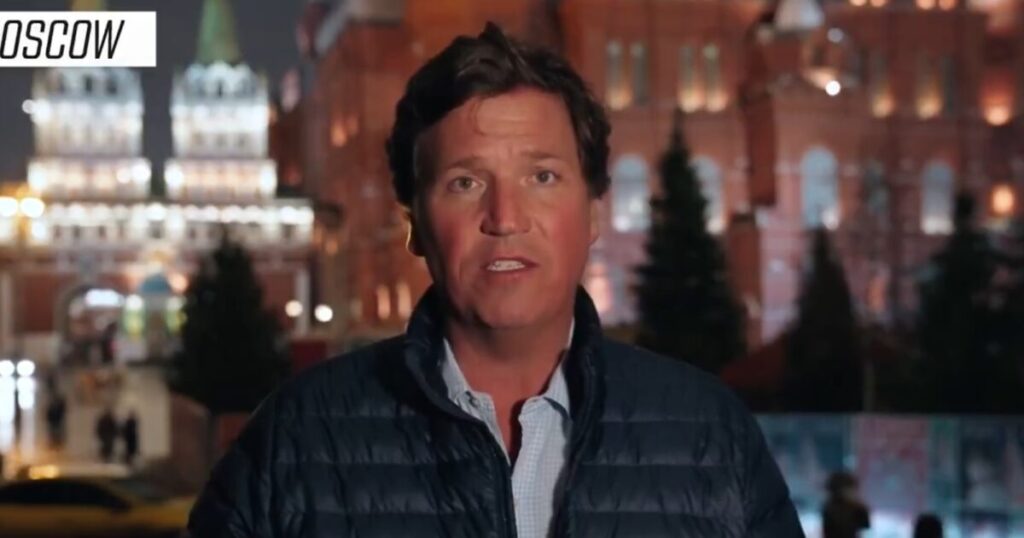Tucker Carlson recently traveled to Moscow in a bid to address escalating tensions between the United States and Russia, particularly ahead of Donald Trump’s impending return to the White House in January 2025. His visit came during a critical time when the Biden administration’s policies seemed to be pushing the U.S. closer to a possible nuclear confrontation with Russia. Carlson’s primary intention was to conduct interviews that might provide an alternative viewpoint to the overwhelmingly Western-centric narratives dominating American media about global conflicts. One of the key figures he interviewed was Russian Foreign Minister Sergey Lavrov, who has been in his position since 2004 and is a veteran of Russian diplomacy.
Carlson highlighted that tension between the U.S. and Russia has reached alarming heights, increasing the risk of a nuclear war. Particularly disturbing, according to him, was the Biden administration’s military actions, which included missile strikes on Russian territory resulting in the deaths of Russian soldiers. He argued that most Americans remain largely unaware of the reality of an undeclared war that is being waged against Russia, a war that many did not vote for and many do not support. Carlson asserted that the current state of affairs makes the world dangerously close to a potential nuclear conflict, even more than during the notorious Cuban Missile Crisis. He expressed concern that without intervention, this could lead to catastrophic outcomes for humanity.
A critical point Carlson made was the absence of diplomatic communication between Washington and Moscow. He revealed that Secretary of State Tony Blinken has severed official channels of communication, leaving no backdoor discussions or avenues for de-escalation. This silence, according to Carlson, deepens the crisis and increases the risks, particularly given the lack of understanding among the American public regarding the true nature of U.S.-Russia relations. He stressed that the prevailing narratives propagated by major American media outlets, like NBC News and the New York Times, continue to overlook the Russian perspective, leaving audiences uniformed about the bigger picture of the geopolitical standoff.
In his efforts to seek more balance in perspectives on the conflict, Carlson noted the challenges he faced in securing an interview with Ukrainian President Volodymyr Zelenskyy. Despite making numerous attempts, Carlson claimed that officials within the U.S. government blocked access to Zelenskyy, directing him to alternative media outlets like CNN instead. This obstruction, he argues, reflects a broader agenda that shuts down attempts to question or scrutinize U.S. policies in the region. As a result, Carlson found himself compelled to return to Moscow for access to Lavrov, the longest-serving foreign minister in the world, to gain insight into Russia’s position and its implications for the future of international relations.
In his interviews, Carlson aimed to explore a range of pressing questions, including the possibility of preventing a full-scale conflict between the U.S. and Russia, the potential reorientation of Russian alliances, and whether Trump’s anticipated presidency could bring about a cessation of hostilities. As Carlson completed the interview with Lavrov, he described it as fascinating, expressing hope that it would provide viewers with valuable information on the complexities of the situation. He emphasized that the interview would shed light on the ongoing war dynamic and the consequences it holds for the global order, the U.S. economy, and the lives of individuals worldwide.
Tucker Carlson’s recent undertakings in Moscow highlight a growing divide between traditional news narratives and alternative explorations of international conflicts. His intention to provide a platform for the Russian viewpoint, combined with his criticism of the U.S. government’s lack of communication with Moscow, underscores the importance of maintaining diplomatic dialogue amid rising hostilities. As Carlson prepares to share his findings with a broader audience, his work serves as a crucial reminder of the risks involved in ignoring diverse perspectives in the increasingly polarized landscape of international politics.

